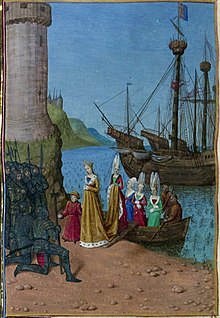While last week's post focused on a woman villainized because of perceived vanity, this week's will focus on a woman who was villainized in the period in which she lived for being too assertive, putting herself into a man's role.

Isabella grew up surrounded by great wealth, as her father was famous for his obsession with wealth and power. She was given a thorough education, better than that of many noble women of her time, and developed a love of reading and learning. She was also said to have been a beauty from an early age, and her husband later gave her the nickname "Isabella the Fair".
When Isabella was still an infant, war broke out between France, her homeland, and England, which had had strained relations in the past. The pope was so concerned by the tension that he got involved, urging Isabella's father to betroth the baby to Edward II, the son of Edward I, the reigning King of England at the time, in order to make peace between the warring countries.

In 1308, when Isabella was between the ages of 12 and 15, she married King Edward II, who had been ruling since his father's death. Unfortunately, Isabella and her husband did not have a happy marriage. Edward was not only unfaithful, but proudly so, and his affairs were always with other men, something which angered Isabella. He would often show them off in front of the court, something which she found humiliating. He showered his lover, Piers Gaveston, with abundant wealth, and often ignored his queen in front of others, including at their wedding feast.
Gaveston was also not popular among the others at court, and found himself exiled from England until his later return and execution in 1312. Soon after his exile, Edward took a liking to another at court, Hugh Despenser the younger.
During this time, Edward was becoming a very unpopular King, especially among his own advisers for ignoring his duties in favor of showing off his favorite men. The Despensers were becoming far too powerful in the eyes of the English barons, as well as Isabella. The barons began to take military actions against the family, and Isabella begged Edward to exile them, for their own good. Edward listened for a short time, but invited them back only months later.
Reunited with his lover, the two began to fight back against the barons, hanging those who opposed them, and imprisoning and executing others at random. The Despensers now had complete control over Edward and the entire country, seizing control of Isabella's money and houses. Edward did nothing to improve his wife's situation, openly siding with the Despensers. In 1322, Isabella left court, angry with her husband's treatment of her, to embark on a ten month pilgrimage. When she returned, she found that her staff had been imprisoned and her children taken away from her. In her mind, this was the end of her marriage.
In 1325, Isabella's brother, the King of France, seized some of Edward's land in France. Isabella was sent as a delegate to preserve peace between the two countries. Instead, Isabella, along with Roger Mortimer, an earl and her lover, gathered support against her husband among the French. They were successful in regaining England, and Isabella saw the Despensers executed in a gruesome manner and her husband unseated from the throne as well as publicly humiliated. Isabella's son, Edward III, inherited the throne, and she later also had her husband killed.
Soon after, her ruling son rebelled against her, having Mortimer killed, and Isabella banished from court. She lived out the rest of her life at Norfolk, where she died in 1358.
For someone like Isabella, being used as a pawn was something that was expected. She was a noble woman, who was sent to a foreign country as a peace negotiation. When there, she was used as a way to produce heirs for the throne, and not treated with any respect. After she finally took control, she was discarded by the son whom she had placed on the throne herself. She was used by every man in her life, and she wanted to break free from that.
The type of double standards used to villainize women like Isabella, whose actions were no worse than any man's, are still present today. Women in positions of power who make brutal decisions are criticized for being too harsh, while men are lauded for their bravery and quick judgment. Because women are viewed as weaker than men, it is shocking to to them when women are able to be cruel, and they retaliate through this double standard.
No comments:
Post a Comment